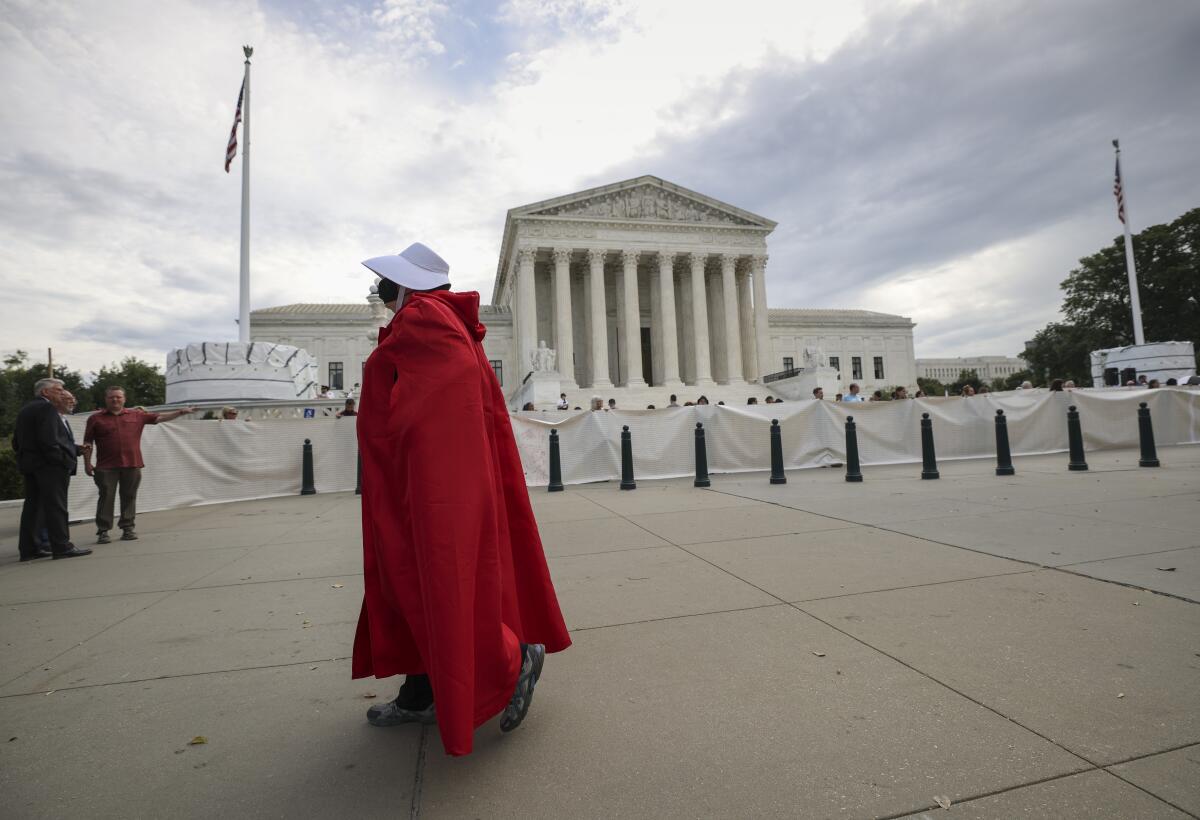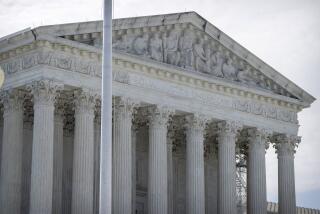Supreme Court justices, including Barrett and Kavanaugh, sound skeptical of Texas abortion law

- Share via
WASHINGTON — The Supreme Court justices gave a skeptical hearing Monday to Texas and its strict abortion law, sounding as though they are ready to reverse course and allow abortion providers to sue and win a federal court order blocking its enforcement.
Justices Amy Coney Barrett and Brett M. Kavanaugh, two of the conservatives who hold key votes, said the state appeared to have gone too far: first by adopting an unconstitutional limit on abortions, then by effectively preventing doctors and clinic owners from challenging it in court.
Kavanaugh said Texas had exploited a “loophole” in the law to bar people from going to federal court — even when those people are targeted by an unconstitutional state law.
He noted that in 1908, the Supreme Court in a landmark ruling said people or businesses who are targeted by an unconstitutional law could win relief from a federal judge by naming a state official who would enforce the law. But Texas steered around that decision by relying on private lawsuits against abortion doctors and clinics.
In response, lawyers for Texas claimed that the abortion doctors were free to defend themselves in state courts.
But Barrett said that would not work either. She said the state law says a doctor could be sued by hundreds of people over a single abortion, yet state judges could rule on only one suit at a time.
“You can’t get a global relief,” even if the abortion doctor wins in a state court, she said. “The statute can still be enforced against you.”
A Texas lawyer said state judges, not state officials, are enforcing the abortion law.
But Chief Justice John G. Roberts Jr. and Kavanaugh cited a landmark ruling on civil rights in which the high court struck down the use of racially restrictive covenants on deeds that prevented Black Americans or Jews from buying a house. Those deeds had been defended on the grounds that they were private arrangements, not state laws.
But as Kavanaugh noted, the high court in the case of Shelley vs. Kraemer in 1948 struck them down, because state judges “enforced” those restrictions. He said the same principle should apply in this case, because Texas is using state judges to enforce a law that appears to violate the Constitution.
Based on their comments and questions during nearly three hours of arguments, six of the justices appeared ready to allow the abortion providers to sue in federal court and seek an order blocking enforcement of the Texas law.
That would be a major change, but it would not necessarily signal how the more conservative court will rule on abortion and the future of Roe vs. Wade, the 1973 decision establishing a right to abortion.
Monday’s argument was the third time the high court has considered the Texas law. The court was not focused on the constitutionality of abortion but, rather, the procedural restrictions that have prevented abortion doctors and the Justice Department from challenging the Texas law in federal court.
While the lawyers argued over procedure, the overriding question is whether the conservative court will stand in the way of a state’s bid to stop abortions. Before Monday, the answer had been no.
The Texas Heartbeat Act, also known as Senate Bill 8, says it is illegal to perform an abortion after about six weeks of a pregnancy but gives the state no direct role in enforcing that ban. Instead, it authorizes private lawsuits in state courts against doctors or clinic owners who violate its provisions.
On Sept. 1, four members of the high court, including Roberts, voted to block the Texas law before it took effect, but they were unable to win over at least one more conservative to form a majority. Two weeks ago, the justices weighed the issue again after the Justice Department entered the case, but they agreed only to hear arguments on the procedural questions.
U.S. Solicitor Gen. Elizabeth B. Prelogar, who was confirmed last week by the Senate, called the Texas law an “affront” to the Constitution, as well as to the Supreme Court’s role in protecting the rights of Americans.
“Texas designed S.B. 8 to thwart the supremacy of federal law in open defiance of our constitutional structure,” she argued. “States are free to ask this court to reconsider its constitutional precedents, but they are not free to place themselves above this court, nullify the court’s decisions in their borders, and block the judicial review necessary to vindicate federal rights.”
But she too ran into skeptical questions. Prior to Monday, it appeared the Justice Department had the stronger appeal. But the justices said they were wary of giving the Justice Department a broad power to sue states for infringing constitutional rights. They believe instead that those laws should be challenged by plaintiffs who are directly injured.
In this case, it was not clear the U.S. government could claim it was directly injured by the Texas abortion law. However, the abortion providers have no problem asserting an injury, because they face the threat of ruinous liability for performing what the state deems an illegal abortion after six weeks of a pregnancy.
Prelogar’s argument rested on the idea that federal law is, as the Constitution states, the “supreme law of the land.” Yet throughout its history, the Supreme Court has shielded states from being sued directly. States are said to have “sovereign immunity” unless Congress has acted to waive it.
After the Civil War, however, the Reconstruction Congress passed the Civil Rights Act of 1871, which authorized suits in federal court against any person who, acting “under color of” state law, deprives others of their rights protected by the Constitution.
Typically, lawyers rely on this section of the 1871 act to sue state or local officials who are enforcing an unconstitutional law. But in this instance, the abortion rights advocates were not sure who to sue. They could not point to particular state officials or to the unknown private individuals who may sue an abortion doctor. As a fallback, they named state judges who might have to rule on a suit.
But the 5th Circuit Court of Appeals has twice rejected efforts to block the Texas law.
The first appeal heard Monday arose from a coalition of abortion providers who sued in July seeking to stop the Texas law. The second came from the Justice Department, which sued in September, a week after the law took effect.
The Biden administration’s attorney acknowledged that the procedural law is not clearly on her side.
“To be sure, no state has ever attacked the supremacy of federal law through this mechanism before,” Prelogar wrote. “But the novelty of Texas’s unprecedented scheme does not render the federal courts powerless to redress the state’s ongoing violation of the Constitution.”
In response, lawyers for Texas argued the legal battle should be fought first in state courts. If abortion doctors are sued for violating S.B. 8, they can defend themselves by asserting that the state law violates Roe vs. Wade and is thereby unconstitutional, Texas Atty. Gen. Ken Paxton argued in his brief.
“The Constitution does not guarantee pre-enforcement review of state (or federal) laws in federal court. And there is nothing unprecedented about vindicating constitutional rights as a state-court defendant,” he wrote.
The two cases heard Monday were Whole Woman’s Health vs. Jackson and United States vs. Texas. It is not clear whether the justices will rule quickly because the cases arrived as emergency appeals or will instead follow the usual procedure and spend weeks writing a decision accompanied by dissents.
More to Read
Get the L.A. Times Politics newsletter
Deeply reported insights into legislation, politics and policy from Sacramento, Washington and beyond. In your inbox twice per week.
You may occasionally receive promotional content from the Los Angeles Times.










